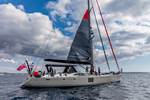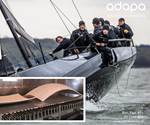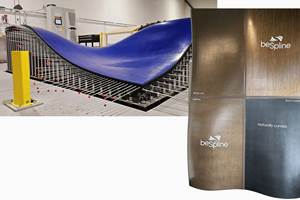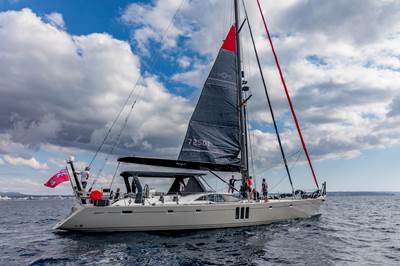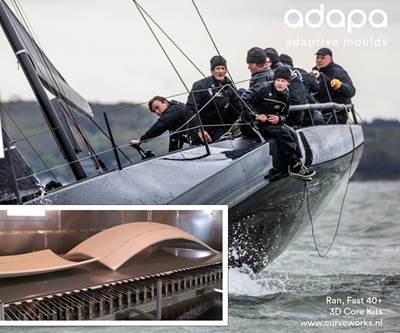BeSpline wins IBEX Innovation Award, announces partnership with Boston Boatworks for Shaped Foam Kits
CAD-driven fabrication uses adaptive mold technology for lighter, stronger, higher quality boat structures without time and cost of building a mold while drastically reducing core fitting time for yacht builders.
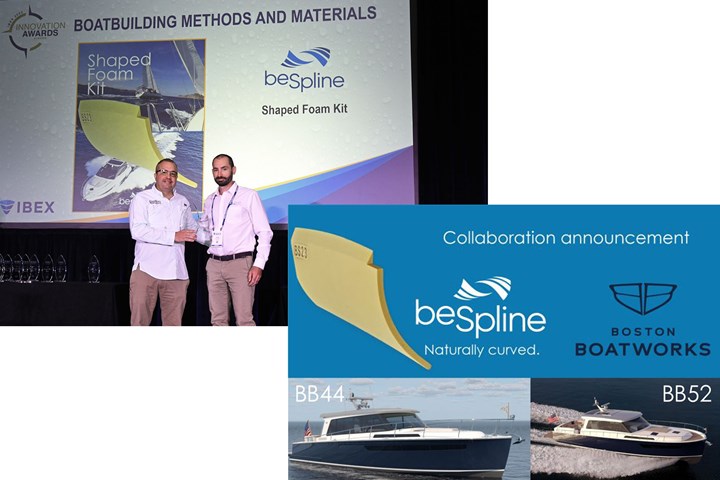
Photo Credit: beSpline
The (IBEX, Oct. 3-5, 2023 in Tampa, Fla., U.S.) awarded (Sherbrooke, Quebec, Canada) the 2023 IBEX Innovation Award in the Boatbuilding Methods and Materials for its Shaped Foam Kit. The program is managed by the and judged by (BWI). The judges selected 13 Innovation Award winners and four honorable mentions from nearly 100 entries submitted by exhibiting marine industry companies.
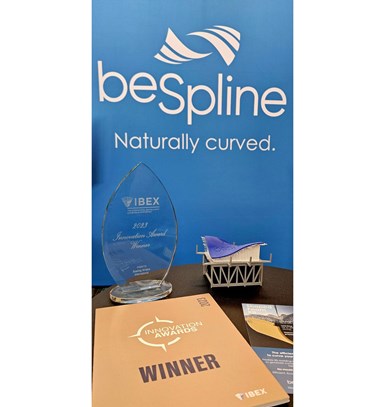
“This honor validates that thermoformed structural foam core is the right choice for weight saving, resin uptake reduction and significant time savings in core fitting during the build,” says Yoann Bonnefon, CEO of beSpline. “The adaptive molding technology allows us to produce Shaped Foam Kits here in North America and all boatbuilders can take advantage of this innovative way to build hulls.”
“One of the longstanding problems in composite boatbuilding is how to turn flat foam panels into the complex curves of a boat hull or deck,” explains IBEX Innovation Award judge, Judge Tim Murphy. “BeSpline’s new North American facility uses heat to ‘thermoform’ flat panels into complex curves, omitting kerfs, that are delivered to boatbuilders in kit form. The result is lighter, stronger, higher quality boat structures.”
Bonnefon also announced that (Charlestown, Mass., U.S.) will be the first U.S. limited production yacht builder to use beSpline Shaped Foam Kits. “We are proud to work with Boston Boatworks to meet the rigorous requirements for the hulls of their Offshore Express series BB44 and BB52 yachts,” says Bonnefon. “Boston Boatworks has built over 360 performance yachts and CoreCell from Gurit [Watwill, Switzerland] has been their structural core material of choice for over 27 years. Their CAD-driven build process enables the use of beSpline’s adaptive mold technology to reduce weight and improve slam load absorption. Our partnership will replace labor-intensive manual thermoforming done by their team in past custom projects with today’s digital technology.”
BeSpline says it is the first company in North America to supply custom-shaped foam kits for yacht builders using an adaptive mold, enabling beSpline to thermoform PVC, PET and SAN structural foam panels, up to 2 inches thick, to create pre-shaped and precut core kits. Compared to traditional 2D kits and contour cut foam core, beSpline offers:
- Up to 60% time saving. Shaped Foam Kits are supplied ready for installation with millimeter accuracy, corrected for springback, with features marked and identification label. A coremap makes installation clear for the builder to follow.
- Up to 25% lighter hulls for faster, more fuel-efficient boats. Tests and calculations show that resin uptake for 20- and 30-millimeter double-cut core increases by 1.4 and 1.5 kilograms/square meter respectively. Saw-cut cores — used for high-density and/or thick cores >40 millimeters — results in resin uptake nearly 5 times higher than that of thermoformed perforated core.
- Up to 4 times stronger hulls and improved mechanical properties.
BeSpline can also make finished sandwich panels using the vacuum infusion process to any single- or double-curved shape.
Boston Boatworks is well renowned for its high-quality yachts and nearly three decades of building advanced composites hulls. It has successfully maintained its position of leadership by continuously bringing innovative materials, technologies and manufacturing processes in order to improve performance, functionality, safety and longevity, therefore providing uncompromising quality boats. Using beSpline adaptive mold technology fits Boston Boatworks’ niche of building custom-quality yachts with the efficiencies and value of limited-series production.”
Related Content
Anemoi installs 35-meter-tall composite rotor sails on Sohar Max maritime vessel
Carbon fiber-reinforced epoxy composites are key to building these long-lasting wind propulsion technologies for energy-efficient watercraft.
Read MorePlant tour: BeSpline/Addcomp, Sherbrooke, QC, Canada
Composites automation specialist increases access to next-gen technologies, including novel AFP systems and unique 3D parts using adaptive molds.
Read MoreDeveloping bonded composite repair for ships, offshore units
Bureau Veritas and industry partners issue guidelines and pave the way for certification via StrengthBond Offshore project.
Read MoreCEAD launches the Maritime Application Center dedicated to industrial 3D printing boat hulls
The MAC is an LFAM-powered production facility equipped with highly automated, digitally driven manufacturing processes and built around a collaborative model to develop the boats of the future.
Read MoreRead Next
BMComposites installs solar-powered composite hardtop bimini for expedition yacht
Contracted hardtop bimini uses a combination of carbon fiber, glass fiber and foam core as well as 20 SP130 solar panels for a highly sustainable and sleek boat design.
Read MoreAdapa reconfigurable molds enable weight saving in the marine industry
Gurit helps demonstrate resin saving and dynamic performance of thermoformed Corecell foam core.
Read MoreCutting 100 pounds, certification time for the X-59 nose cone
Swift Engineering used HyperX software to remove 100 pounds from 38-foot graphite/epoxy cored nose cone for X-59 supersonic aircraft.
Read More
